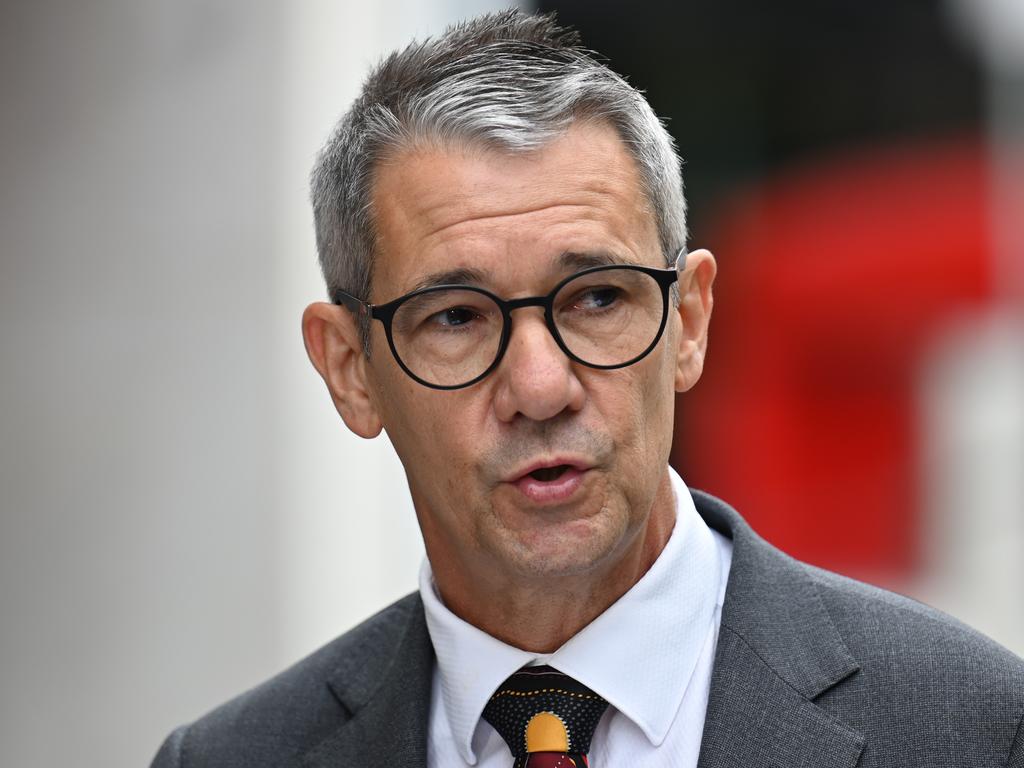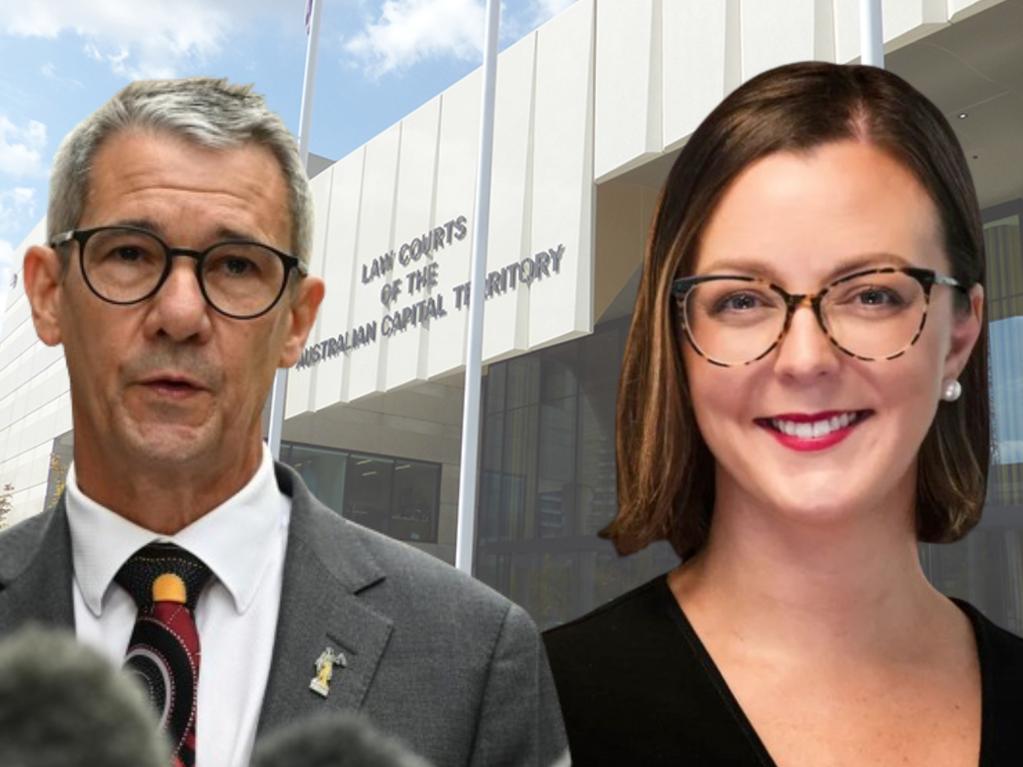ACT prosecution bungle hands child sex predator Stephen Mitchell get-out-of-jail early card
A convicted child sex predator will walk free years earlier than his sentence because of a disastrous error by ACT prosecutors who failed to act despite a warning.
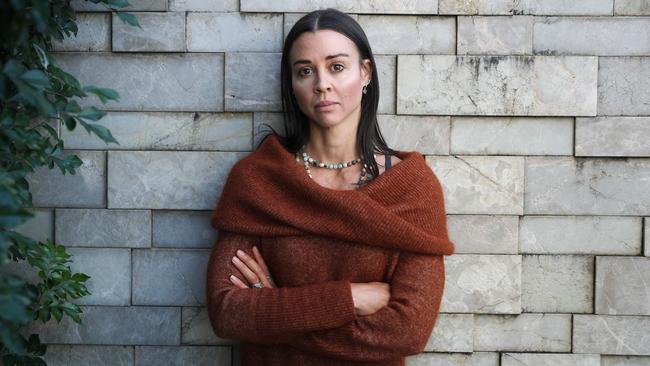
Convicted child sex predator Stephen Leonard Mitchell will walk free from jail years earlier than his original sentence because of a disastrous error by ACT prosecutors who had been specifically warned of the problem but – according to Mitchell’s victims – were so preoccupied with the Lehrmann rape case they failed to act on the advice.
In a recent conference with Mitchell’s devastated victims, then-acting director of public prosecutions Anthony Williamson – who was not the director at the time of the bungled case – acknowledged the DPP office had failed victims, including with miscommunications and allocation of resources against the background of the Lehrmann case.
But due to errors by the ACT Office of the Director of Public Prosecutions and the trial judge, the sentences for the agreed plea deal with the former rock climbing coach were based on the current maximum sentence of 25 years when they should have been based on the seven-year maximum sentence at the time of offending.
The bungle means the serial pedophile is certain to have his sentence significantly reduced at a hearing in August, potentially creating a precedent for other offenders to exploit.
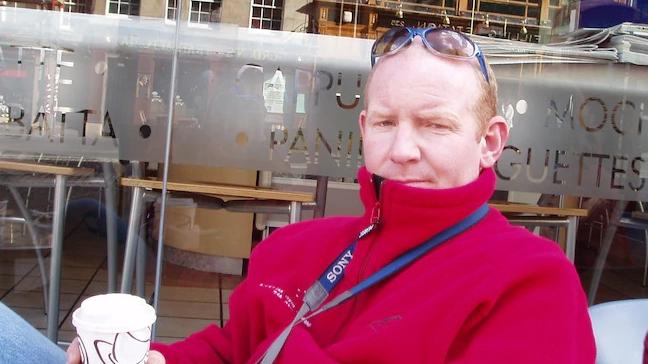
The botched prosecution has shattered Mitchell’s victims, who have told The Australian they would never have agreed to a plea deal if they had been aware of a sentencing glitch that would substantially lessen his jail time.
Two of the women agreed not to pursue more serious charges of sexual penetration against Mitchell on the understanding that his prison term would be based on the maximum 25-year sentence available.
Sophie Vivian, who was just 11 when Mitchell began grooming her, had made a full statement to the police detailing acts of penetration that were never put before the judge.
“The problem was that we as victims were given false information by the public prosecutors, and we based our decisions on that false information,” Ms Vivian told The Australian.
“There was a lot of pressure placed on us by the prosecutors to accept those plea deals. The way it was sold to us was – this is really great, it’s a really serious charge. It has a 25-year maximum, which is the highest in the ACT, other than murder.”
The women were told they should accept the deal because it would mean they wouldn’t have to go to trial and be cross-examined about their traumatic experiences.
“But that 25-year maximum was repeated multiple times in those conversations, like, don’t worry, it’s a really big sentence, he’s f..ked – those were the words we were given.”
DPP knew before
The ODPP has now acknowledged that it was “a significant error that should not have happened”, but was “attributable to numerous people, and which was perpetuated through multiple steps in the process”.
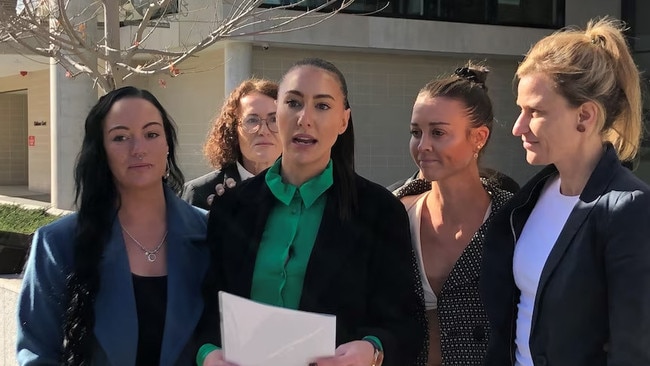
“It appears to have occurred as a result of a gap in the internal knowledge in the DPP at the time,” prosecutor Emma Roff wrote to one victim in an email on May 8 this year.
However, The Australian has seen an earlier email sent by crown prosecutor Katie McCann acknowledging the DPP was made specifically aware of the sentencing problem in May 2022, following a case known as Ware, in which the correct sentencing had been applied under new legislation.
In the email Ms McCann states that “the effect of the decision was brought to the attention of the Director, Deputy Directors and Sexual Offences Unit on 2 May 2022 via email. The former Director (Shane Drumgold) proposed to raise the issue with the Attorney-General (Shane Rattenbury). I am unaware whether this was done.”
That was six months before the women agreed, in November 2022, not to give evidence about the more serious charges of penetrative sex, believing the 25-year maximum sentence was on the table.
“The ODPP tried to make out like this outrageous outcome was essentially the judge’s fault, or else it was a problem with the legislation,” Ms Vivian says.
“Well now they have fessed up, and the reality of course is that – if the correct charges had been laid, and if victims had been given correct information by the ODPP and supported by the ODPP to give their evidence, then Stephen Mitchell would most likely have received a significant and fair sentence, even under the old legislation … that was a pretty big screw up.”
‘They failed us’
Another of Mitchell’s victims, Odette Visser, told The Australian she would never have accepted a plea deal based on a seven-year maximum sentence.
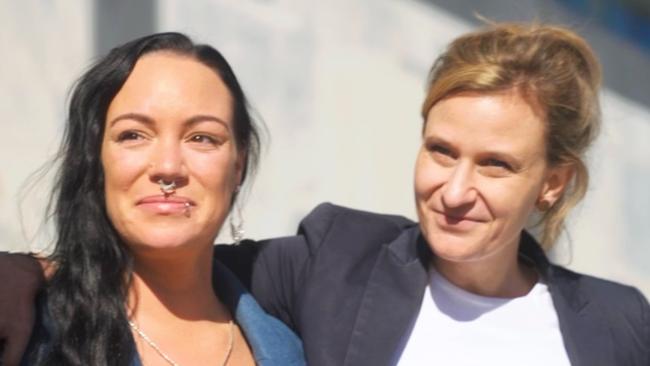
“My offender said he would plead guilty if I dropped the claims of penetration. The DPP said that he would still be sentenced under the 25-year maximum if I dropped that part of my complaint.
“I thought about how going to trial would affect me and how unwell it would make my parents, having to hear about my childhood rape. I chose to protect myself and my loved ones and accept the plea deal. After all, he was facing three counts under the 25 years. How much did I need to bury this guy? It wasn’t worth burying my parents too.”
Ms Visser believes Mitchell may be re-sentenced to just 12 months for his crimes against her.
“It’s devastating. The DPP traded away his most serious offending, and now that we are being dragged back to court, it’s hard to know what we got for accepting that course of action.
“I don’t want responsibility for this mistake to fall on overworked junior prosecutors. This went through the DPP leadership and they failed us.”
Ms Visser says she was horrified when she realised the DPP was aware of the sentencing issue in the Ware case before she and the other victims were encouraged to accept the plea deal.
“They knew that this decision in the court would change everything for victims … They understood the significance of the situation. They called the leadership in to discuss it. They resolved that they needed to alert the Attorney-General that this could change everything. And then nothing happened.”
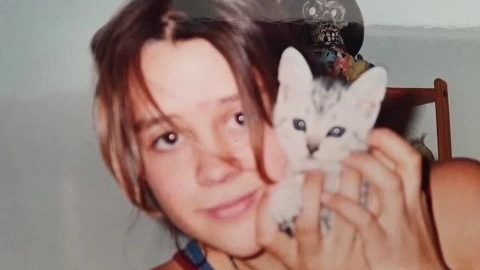
‘On the back burner’
Worse, Ms Visser says, was the realisation this had happened in the lead-up to the Lehrmann trial, confirming suspicions they spelt out to The Australian last year that the Brittany Higgins/Lehrmann case had devoured the time, focus and resources of the DPP.
Mr Drumgold, the then-DPP, took the unusual step of personally prosecuting the Lehrmann case – the only rape trial he ever conducted as director – while far from the television cameras, a series of much less senior prosecutors were negotiating the deal with Mitchell’s lawyers that would allow him to escape the most egregious charges against him.
“When I saw that that happened in May 2022, it doesn’t take a genius to figure out what they were more distracted with, and six child victims were put on the back burner again,” Ms Visser says.
“We made ourselves available at every hour, for hours for days, for weeks, and we were continually put on hold for another matter. And six child victims are now getting called back to court again.”
‘An utter debacle’
Ms Vivian believes Mr Drumgold “was distracted, not overseeing important cases that he should have been”. “The problem was an utterly dysfunctional office led by a distracted – and now disgraced – director,” she says.
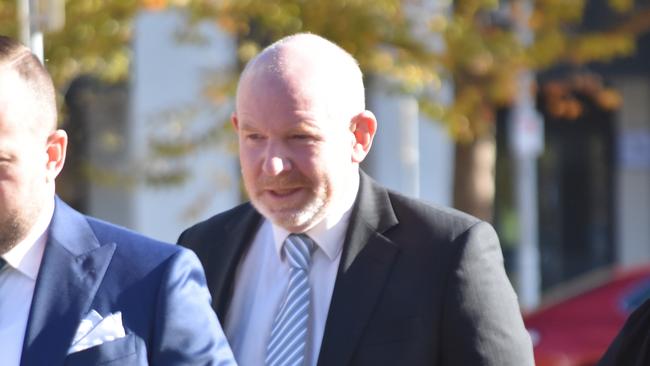
Lawyers have told The Australian that chronic underfunding of the DPP’s office by the ACT Labor-Greens government meant prosecutors were “just hopping from one case to another” and had overlooked what should have been obvious to them.
Several of Mitchell’s victims were invited last month to a meeting at the DPP offices in Canberra, called to explain the mistake, a visit that reminded Ms Visser of the struggle to get attention on their case in the midst of the Lehrmann trial. “It was nice not to have to push past staff glued to the windows watching Brittany walk past,” she says.
During the conference Ms Vivian referred to the Sofronoff Board of Inquiry’s finding of gross misconduct by Mr Drumgold in the Lehrmann case, saying: “I don’t feel like there has been any recognition of how much that circus impacted our case directly … it was a shit show … an utter debacle.”
According to a file note of the meeting taken by a DPP lawyer, Mr Williamson responded: “I acknowledge and accept that there have been failings in office in how matters progressed – miscommunications and re-allocation, background of Lehrmann and Board of Inquiry. I recognise that and it shouldn’t have happened.”
Mr Williamson apologised to the women for what had occurred. “He seemed genuinely sorry but he’s the wrong person apologising. He was not the director at the time,” Ms Vivian says.
She would like an apology from Mr Drumgold.
“I was a victim in a very serious child sex offence case before the ACT Supreme Court as he was director. There were multiple points where he could have at least had oversight over such an important case, being the director. “
Ms Visser says that at a meeting with the new ACT DPP, Victoria Engel, appointed this month, Ms Engel said “she suspects there was a culture of rubber stamping matters in busy times”.
“It went through the sex crimes prosecutors, then it went to deputy directors, then it went to the director, and all of them signed off on it,” Ms Visser says. “It seems like nobody even really read it.”
Ms Visser is disappointed Ms Engels wasn’t willing to contact any of the DPP lawyers who had carriage of their case to ask what had happened, but instead had simply agreed that in-house training needed to be improved.
The two victims disagree training was the problem.
“I think the problem was that the entire place was in a shambles at the time,” Ms Vivian says.
“The police and prosecutors were at total odds. They weren’t co-operating.
“We had three different prosecutors, and by the time we got the third one it certainly felt like the case had only landed on his desk five minutes ago because there was all kinds of information about it that he wasn’t aware of.
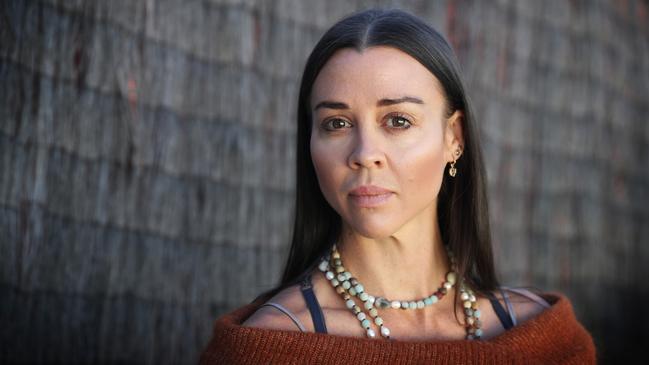
“I did my bit as a victim – I feel like it’s my job to turn up and to tell the truth. And it’s their job as prosecutors and lawmakers to make sure that the sentence fits the crime. They didn’t do their bit.”
Empty promises
The women have been told they cannot bring a new complaint, regardless of the error by the prosecution, as the plea was negotiated by the defence in good faith.
Mr Rattenbury, the Attorney-General, has ruled out any retrospective amendment to the law to change the outcome in the Mitchell case, but said the government would consider whether any “clarifying amendments” could be made in the future.
Ms Visser and Ms Vivian would like Ms Engels to hold a formal review of her department to examine the impact of the Lehrmann case and what went wrong with their case.
“Victoria Engel was really fantastic in her response to us but a promise that it’s never going to happen again that isn’t backed up by a proper inquiry into exactly what happened and whose fault it was is pretty empty,” Ms Vivian says.
“Shane Drumgold’s involvement in that case took him away from analysing a case which held six child victims,” says Ms Visser. “That might’ve been the right call, but we need to ask that question.”


